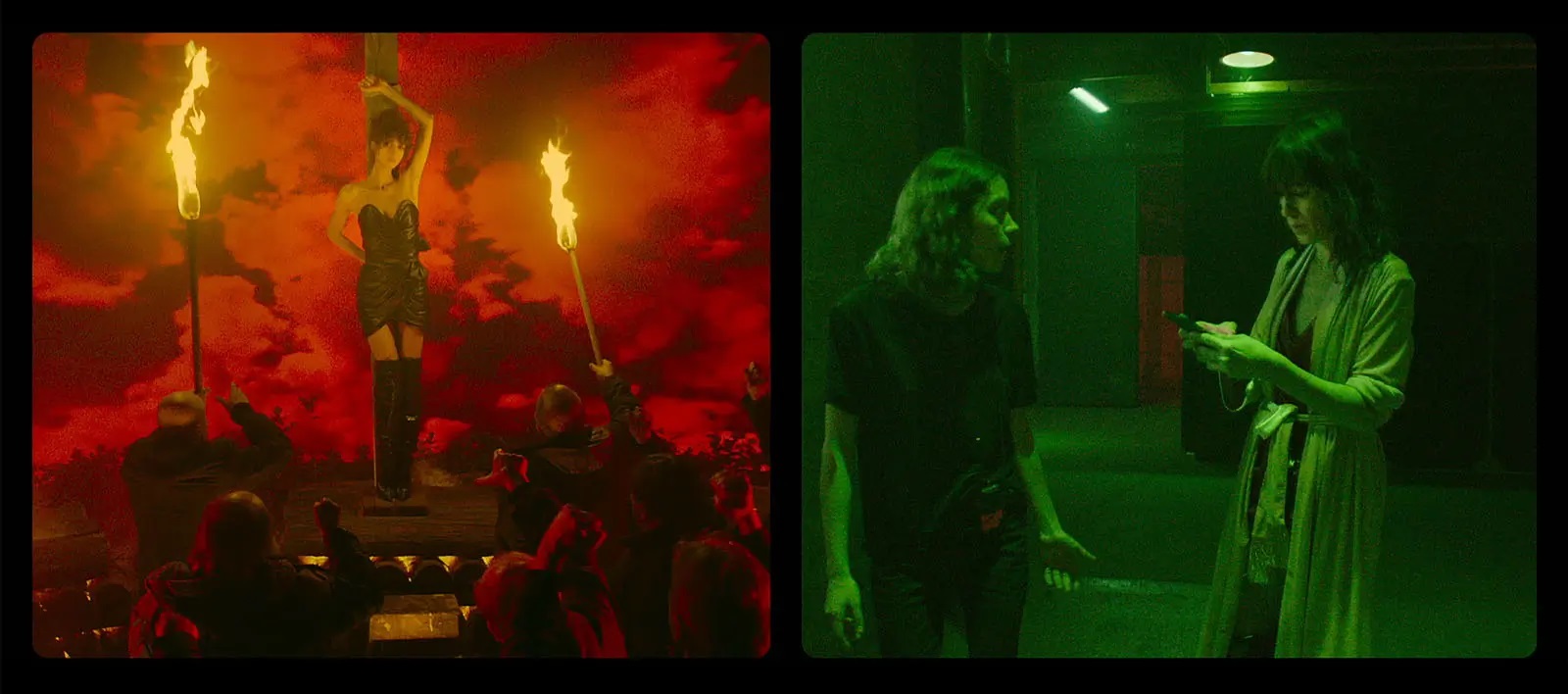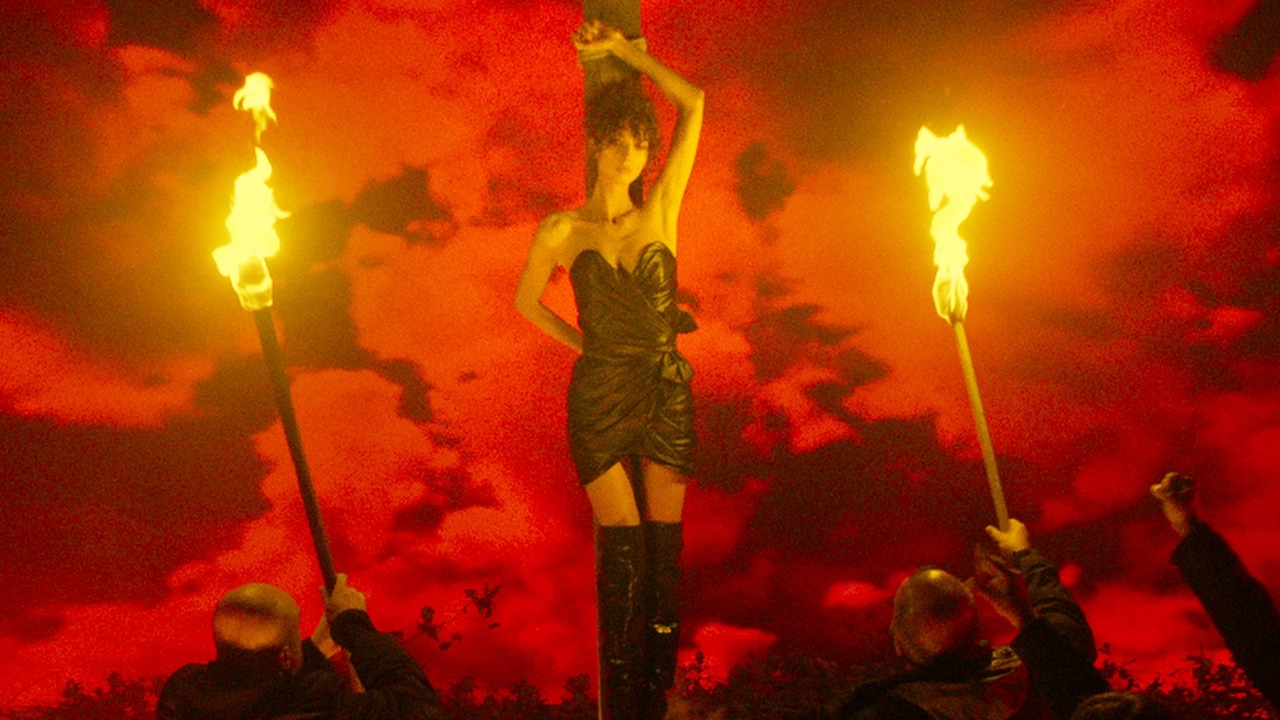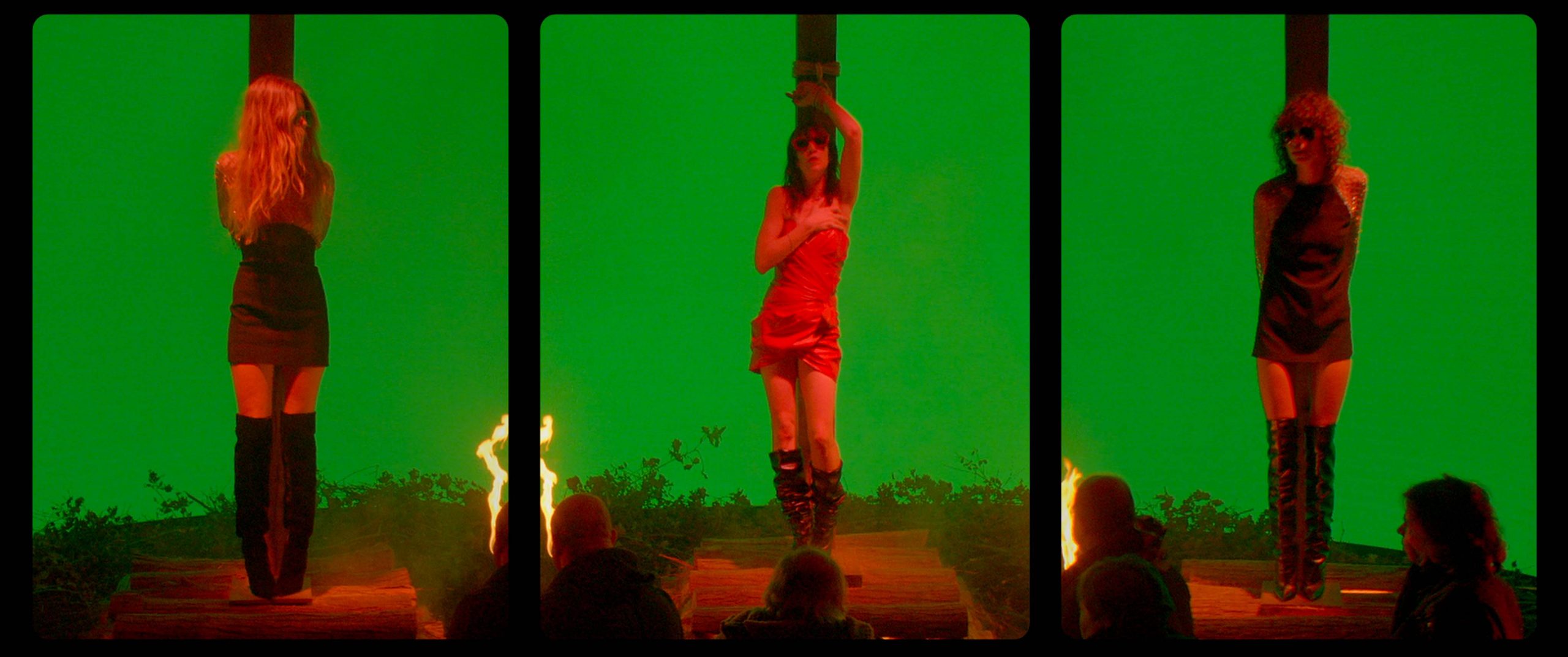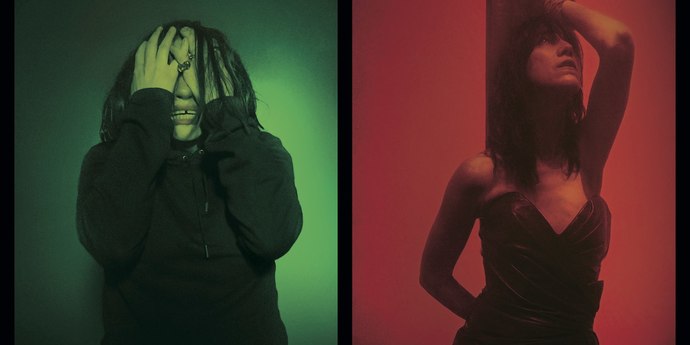Gaspar Noe’s filmmaking alone is enough to attract attention. Regardless of what he is telling or what he will tell, everything Noe does becomes a subject of curiosity. If he were to take a walk in Times Square, one would think he was a local citizen from Anatolia, but Noe’s inner world is utterly contrary to his outward appearance. He is a true enigma himself. With each film he creates, he attempts to explore cinema, leaving viewers questioning, “What did I just watch?” And once again, the director did not fail to surprise me, at least. When I went to the cinema, I was sure that I wouldn’t love this film as much as I loved Climax. And I was right. But I never wanted to be proven so wrong in my life. Yet, in reality, I became a part of a global eye-dazzling operation instead of watching a film.
In short, let’s talk about the “subject” of the film… In this film, where the actresses portray themselves, Charlotte Gainsbourg plays the role of a witch about to be burned. Unfortunately, due to the director’s obstinacy in sticking to outdated methods and the producer’s incompetence, the film becomes a jumble. The actors who came there to make a movie find themselves in senseless chaos.

First and foremost, we must discuss this: Is Gaspar Noe mocking himself, or does he genuinely believe in his words? Because if he is serious about his statements, he falls short of what he criticizes. Everything Lux Æterna wants to convey is actually hidden within Beatrice Dalle’s rebellion.
I am tired of intellectual absence! (J’en ai marre de l’absence intellectuelle!)
Throughout the entire Lux Æterna, Gaspar Noe indirectly tightens his own noose by targeting Hollywood cinema. He claims that they work with massive budgets while we create art in poverty. However, after witnessing what unfolds on the set, I couldn’t help but wonder if he is mocking ArtHouse cinema with a twist. Because you won’t find the chaos that occurs under the guise of art cinema in Hollywood. What makes Hollywood successful is their ability to finish a film behind closed doors. Everything is planned, and the system works smoothly. They don’t strive to create substance from scarcity like in the movie. They have the money, but I’m sorry, it’s not their fault… Marketing the chaos devoid of professionalism as something beautiful, at least in the end, is, I don’t know, ridiculous.
While Charlotte Gainsbourg, Abbey Lee, and Beatrice Dalle come to the set with the hope of making a good film, they encounter intellectual absence once again. Actually, we need to discuss what intellectualism means as well… everything that happens on the set is a complete disaster. It’s unbearable. It reeks of amateurism from every aspect. People pitching new projects during shoots and critics being invited to the set. Everything is not as it should be. But Beatrice Dalle solves this problem too:
The end justifies the means.
As long as the audience continues to show interest in Gaspar Noe and similar filmmakers’ attempts to rediscover cinema, we will continue to be subjected to absurd films. Because, in the end, everything that emerges from all that disgrace will be accepted with the phrase, “Well, at least it was a beautiful film.” Dalle doesn’t utter those words in vain. The only reason Jean Luc thinks he is making art while engulfed in absence and chaos, screaming, “you’re burning, Charlotte,” is the Cannes crowd. I find Gaspar’s constant remarks about how much we suffer and how it results in art, as well as his “at least I’m an atheist” in the final scene, equally dull and cringe-inducing. Now let’s all stand up and applaud for 15 minutes.
Gaspar Noe defends his own cinema by taking jabs at Hollywood throughout the film, using quotes and references from old beloved directors. Now, look, no one can guarantee that if Carl Theodor Dreyer were alive today, he wouldn’t make a Marvel film, sorry. The resources of Hollywood do not make them soulless. Cinema, as it has been since 1895, is both a means of contemplation and entertainment. Yesterday, I watched a Gaspar Noe film, and tomorrow I can watch a Fast and Furious movie without getting bored. That’s precisely what cinema is. If the eye-dazzling operation in the final moments of an actual art film is what defines cinema, then I admit, I don’t understand it. As I said, I don’t want to dwell on whether the director is mocking or not, as I still haven’t figured it out.

Does Lux Æterna do everything poorly, then? No. For instance, it indeed provides a beautiful preview of the set environment. For a set to be successful, both the director and the producer need to be authoritative. Otherwise, the result will be exactly what you see in Lux Æterna. The director’s incompetence in claiming, “I’ve worked with Jean Luc,” turned everything into a disaster. If you don’t want Beatrice Dalle cursing around on your set, work with a good director and producer. Let’s not forget this: Jean-Luc taking advantage of the chaos and suddenly transforming into an ArtHouse director, or as Fassbinder said, becoming a dictator, was interesting. The director, thinking he’s creating “art” by exploiting Charlotte’s weakest moment, would face severe consequences in Hollywood. There’s something called a contract; it’s hard as steel, you can’t just do whatever you want. But, as we say, at least it was a good film. 15 minutes of applause.
Lastly, I will touch upon the topic of witches because it caught my interest, and I conducted some research on it. I don’t know why witchcraft was chosen here, but if I were to find a reason, it might be that witch hunters resemble directors. Why? Because they would say, “I did it; it’s done.” Between the 14th and 17th centuries, it is known that over 60,000 people were accused and killed on charges of witchcraft. However, the exact number of 60,000 is impossible. In the year 1234, the city of Stedinger, located on Dutch territory, was massacred entirely simply because they refused to pay the appointed bishop of Bremen. The justification? They were all accused of witchcraft. During those times, once you accused someone of being a witch, their life was doomed. However, individuals labeled as witches in films were not immediately burned at the stake. Courts would give them a chance to defend themselves. But the purpose of the court was not to determine innocence, but to persuade. As a result, the majority of ordinary citizens, unable to withstand the pressure, would eventually confess to being a witch. This witchcraft topic even turned into a kind of business at one point. The 1968 film Witchfinder General is a prime example of that. A man who couldn’t violate women as he pleased would accuse them of witchcraft and then have them burned.
As mentioned in the Lux Æterna, individuals believed to be witches were thrown off stone bridges built over rivers. If they drowned, they were not witches; if they survived, they were witches. In any case, the woman was the loser. A similar pressure is present in the film. The actors, especially all women, are crushed under masculine domination. When Charlotte realizes that she can’t escape, she finally gives in and surrenders herself to the fire. The fact that the director works with Jean Luc is also a separate irony because Godard is a complete jerk when it comes to women.

In essence… If Gaspar Noe is mocking himself, with Lux Æterna, then he does a successful job by depicting the absurdities of the lack in ArtHouse films. I give credit where it’s due. But if he is serious in what he portrays, claiming that art emerges from chaos… I can’t help but laugh. It’s truly disheartening to praise an unprofessional and repulsive environment. Gaspar’s belief that he creates art through color and sound harassment in the final moments is unfortunate. However, since the audience thinks he’s exploring cinema, they will praise it, as Dalle said. Yet Abel Gance had already discovered the splitting of the screen into three, not just two, in 1927. It is, of course, typical for those who are unaware of this to find Noe’s actions innovative.
Lastly, I would like to say this: If any of us were to attempt to make such a wretched film with our Canon cameras, we would be buried in the ground, never to resurface, but when it’s Gaspar on the chair and Charlotte Gainsbourg in the frame, they won’t stop praising it. So, I hope I’m mistaken about the praise. Please, let me be wrong.

Cast & Crew
director: Gaspar Noé
writers: Gaspar Noé
starring: Charlotte Gainsbourg, Béatrice Dalle, Abbey Lee, Karl Glusman
FRANCE | 2019 | 51 MINUTES |
